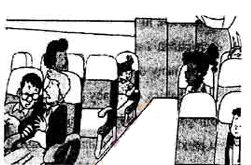


科目:初中英语 来源: 题型:阅读理解
| A.feces | B.feces of an infected person |
| C.water | D.mucus |
| A.to keep the air fresh in a child’s room | B.wash hands regularly |
| C.see a doctor | D.stay in crowded public places |
| A.传染的 | B.感染的 | C.正常的 | D.康复的 |
| A.It’s the same as Mad Cow Disease . | B.It first appeared in China. |
| C.Adults can be infected too. | D.There is vaccine now. |
| A.The history of SARS | B.What’s and how to prevent HFMD |
| C.HFMD in China | D.How to prevent HFMD |
查看答案和解析>>
科目:初中英语 来源: 题型:
| A.stopped | B.found | C.met | D.saved |
| A.to show him the way to town |
| B.how long it would take him to get to town |
| C.to give him some money |
| D.to tell him where the town was: |
| A.thought the traveler a was rude man |
| B.didn't know the distance |
| C.wanted to tell him later |
| D.didn’t know how fast the man could walk |
| A.After the traveler got to town |
| B.After the traveler had walked some distance. |
| C.when he wasn't angry. |
| D.When the traveler asked him a third time. |
查看答案和解析>>
科目:初中英语 来源:2012届福建省泉州市初三升学考试(样卷)英语试卷(带解析) 题型:完型填空
从每小题A. B. C三个选项中,选择可以填入空白处的最佳答案
Do you need trust (信任) from others? Yes! Everyone needs, 1 his or her parents. Parents would like to give you 2 space if they trust you. If you want your parents to trust you, you have to show 3 through action.
Let your parents 4 what’s going on at school and something else. Keep your bedroom door open when you’re back. Don’t be mad when they see what you’re 5 on the Internet. Invite your friends 6 your house to meet your parents.
When you do 7 wrong, it can break trust. It’s easy to find some reasons not to tell your parents what you’ve done wrong. For example, you don’t want them to be 8 with you and …The list can go on and on. But if they find the 9 , you’ll be in hot water. Broken trust takes long time to recover (恢复), 10 you can do things gradually (逐渐地) to help your parents believe in you again.
【小题1】A. really B. finally C. especially
【小题2】A. many B. more C. most
【小题3】A. him B. her C. them
【小题4】A. know B. to know C. knowing
【小题5】A. looking for B. looking through C. going through
【小题6】A. on B. to C. from
【小题7】A. something B. anything C. everything
【小题8】A. happy B. angry C. pleased
【小题9】A. truth B. reason C. way
【小题10】A. or B. and C. but
查看答案和解析>>
科目:初中英语 来源:2010年天津市高中阶段教育学校招生统一考试英语卷 题型:阅读理解

Do you learn from your mistakes? I hope so. But have you ever made the same mistake twice? I have. Sometimes I make the same mistake three or four times!
Sometimes, good things happen because of mistakes. Once I got on the wrong train. That was a big mistake. But on that train, I saw a good friend. I was so happy I made that mistake!
Another time I ruined a surprise. My mother planned a surprise party for my father. She told me it was a secret. But I was just a little boy and I couldn’t keep the secret. I told my father about the party. At first, my mother was mad at me. But then my father said he was happy he knew about it. He said he didn’t like surprise.
When a good thing comes out of a mistake, that’s a happy accident.
【小题1】The boy saw ___ on the wrong train.
| A.his friend | B.his father |
| C.his mother | D.his teacher |
| A.plan a surprise party | B.tell his father about the party |
| C.keep a secret about the party | D.invite his friend to the party |
| A.Mistakes are not welcome. |
| B.A mistake is terrible thing.. |
| C.All mistakes men happy accidents. |
| D.Sometimes a mistake can be a good thing. |
查看答案和解析>>
科目:初中英语 来源:2011-2012学年福建省泉州市初三升学考试(样卷)英语试卷(解析版) 题型:完型填空
从每小题A. B. C三个选项中,选择可以填入空白处的最佳答案
Do you need trust (信任) from others? Yes! Everyone needs, 1 his or her parents. Parents would like to give you 2 space if they trust you. If you want your parents to trust you, you have to show 3 through action.
Let your parents 4 what’s going on at school and something else. Keep your bedroom door open when you’re back. Don’t be mad when they see what you’re 5 on the Internet. Invite your friends 6 your house to meet your parents.
When you do 7 wrong, it can break trust. It’s easy to find some reasons not to tell your parents what you’ve done wrong. For example, you don’t want them to be 8 with you and …The list can go on and on. But if they find the 9 , you’ll be in hot water. Broken trust takes long time to recover (恢复), 10 you can do things gradually (逐渐地) to help your parents believe in you again.
1.A. really B. finally C. especially
2.A. many B. more C. most
3.A. him B. her C. them
4.A. know B. to know C. knowing
5.A. looking for B. looking through C. going through
6.A. on B. to C. from
7.A. something B. anything C. everything
8.A. happy B. angry C. pleased
9.A. truth B. reason C. way
10.A. or B. and C. but
查看答案和解析>>
湖北省互联网违法和不良信息举报平台 | 网上有害信息举报专区 | 电信诈骗举报专区 | 涉历史虚无主义有害信息举报专区 | 涉企侵权举报专区
违法和不良信息举报电话:027-86699610 举报邮箱:58377363@163.com